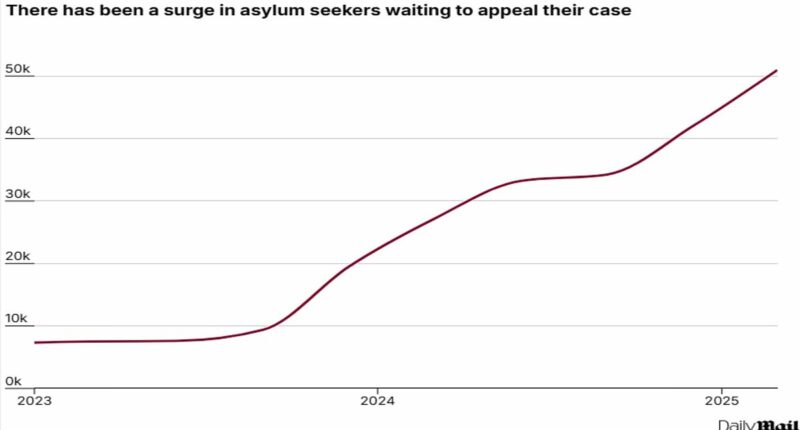Share this @internewscast.com
Official statistics indicate a dramatic increase in asylum seekers contesting denied applications, resulting in the courts being ‘overburdened’ while migrants linger in government-funded limbo.
According to the Ministry of Justice (MoJ), by March this year, active asylum appeals in the tribunal courts had soared to 51,000, a significant jump from 7,600 in June 2023.
This surge implies that half of the 100,000 asylum seekers residing in the UK are challenging the rejection of their initial applications.
Specialists assert that the influx has left the courts ‘overwhelmed’ as migrants fervently navigate the legal system to secure their stay in Britain.
However, the unparalleled pressure on the judicial system could mean migrants remain in limbo for ‘several months, if not years’ as they await their hearings.
In the interim, the government supports them with accommodation, complimentary healthcare, meals, prescriptions, dental services, and education for their children.
Robert Bates, of the Centre for Migration Control, said: ‘It is clear that the system is overwhelmed and not fit for the modern challenges facing Britain.
‘A combination of glacial application processing, and a record number of appeals, has meant the British taxpayer is forced to continue paying for people who should not be in this country.
‘Many appellants will be those with dangerous backgrounds who pose a real threat to the British public, but will remain free to roam the streets.’

Experts say the courts have become ‘overwhelmed’ with migrants desperately trying to use the legal system to remain in Britain
It comes as Britain is still reeling from the shocking case of the Somali career criminal Haybe Cabdiraxmaan Nur, who murdered an innocent father in Derby by plunging a knife into his chest after the Channel migrants’ asylum claim was rejected.
Appealing the Home Office’s decision is commonplace, with figures showing more than three-quarters of refused asylum seekers lodged an appeal between 2004 and 2021.
And they have a good chance of winning, with more recent numbers for 2024/25 showing nearly half (45%) of determined appeals were granted.
Experts say the huge growth in appeals to the courts has been driven by the Home Office’s widely self-publicised success in reducing its own asylum backlog.
From 2007 to 2022, the first-tier tribunal completed roughly the same number of cases as it received each year.
But in 2023 and 2024, the courts were handed more than twice as many fresh appeals (70,000) as it was able to complete (28,400).
The process has been described by York University legal scholar Joe Tomlinson as essentially a Home Office ‘reassignment’ of its backlog to the MoJ.
In a bid to finally clear its backlog, the Home Office more than tripled its asylum casework staff count in two years, from 600 in 2021 to more than 2,100 in 2023.
Alp Mehmet, of Migration Watch UK, told the Mail: ‘The end result would be the same whichever department dealt with it.
‘The government is simply not devoting sufficient resources or experienced officials to go any quicker.
‘In any case, all that happens when applications are resolved is the problem of accommodating normally moves from central to local government.
‘The real impact would come if applications are not only resolved quickly but those refused are removed at pace too. And that simply isn’t about to happen.
‘One way or other, the British taxpayer is on the hook for housing and feeding small boat migrants – which can also have devastating implications for public safety.
‘The government should issue blanket asylum denials for small boat migrants who have already shown disregard for our laws by illegally crossing the Channel.’
It comes after the Home Affairs Committee issued its damming report into Asylum accommodation this week, which blasted the government for a series of failures.
Included in the 117-page document was advice that ‘reducing the appeals backlog’ was a key step in reducing the number of people in asylum accommodation.
The backlog has also played a role in the spiralling costs for taxpayers, with Home Office data showing it spent around £5.4bn on asylum in 2023, more than twice as much as in 2021.
Those in the hotels, which average £145 per night, are usually provided meals along with £8.86 per week.
The handout amount rises to £49.18 per week if no meals are provided. Extra money is also provided to pregnant mothers and young children.
Costs to the taxpayer rise even further when the legal fees at the Immigration and Asylum tribunals are considered.
On paper, it costs a migrant £80 to £140 for a first-tier tribunal hearing, while upper tribunal appeals are free.
However ‘many asylum applicants do not pay these fees if they receive legal aid, asylum support, or a fee remission,’ Dr Peter Walsh, senior researcher at the Migration Observatory at Oxford University, told the Daily Mail.
‘All this excludes legal costs, which could go into the thousands for a case.’
Asylum seekers often argue at appeal they should be able to stay in the UK as returning to their country of origin would expose them to ‘serious threats to their life or freedom’.
These arguments are made under the UN’s 1951 Refugee Convention, which the UK has signed alongside 148 other countries.
In these cases, they must demonstrate a ‘well-founded fear of persecution’ due to their race, religion, nationality, political opinion, or membership of a particular social group, such as gender or sexual orientation.
Another route of appeal, if the refugee threshold is not met, is to argue they would be at risk of ‘indiscriminate violence’ if they were to return to their home country. This is known as the Humanitarian protection route.
A third way to remain is to use the European Convention on Human Rights (ECHR) to argue that removal would disproportionately interfere with their family life in the UK.
Dr Walsh explains that during the tribunal, claimants typically provide country-of-origin material, expert reports (such as on their medical history or age), witness statements, and any new evidence that undermines the initial refusal.
But the immigration and asylum tribunals have proven controversial due to claims that judges there could potentially be breaching the judicial code of conduct by advocating highly charged political views
In April, Shadow Justice Secretary Robert Jenrick said the courts had been infiltrated by ‘activist judges’.
Research compiled by the Conservative Party showed immigration judges had made political remarks about the system they are supposed to adjudicate upon impartially.
For example, one judge works for an organisation which provides weekly advice sessions for migrants in northern France who are seeking to enter Britain illegally by small boat.
This has not been helped by a number of decisions which have alarmed the public, such as the decision last week by one judge to decide that one Syrian migrant with a ‘receding hairline’, ‘grey hair’ and ‘crow’s feet lines’ was 16.
A shortage of immigration lawyers also adds lengthy delays to asylum appeals.
It has led to many cases being adjourned or individuals deciding to represent themselves, which typically makes a hearing six times longer than one with legal representation.
In December 2024, the Lady Chief Justice, Baroness Carr of Walton-on-the-Hill, told the House of Commons Justice Select Committee that the immigration and asylum tribunal was a ‘pinch point’.
She said: ‘I often think of the judiciary and the courts as a pinch point in an hourglass. We are not like a business.
‘We cannot close for business. We are not like a restaurant that can say, ‘Our tables are full, so we won’t take any more reservations.’
‘We are completely susceptible to the work that comes in.
‘We only have so many judges, so many courts and so many magistrates to deal with the work. Just because there is more work does not mean that the work can be done.’
Earlier this year, the MoJ announced it was undertaking annual recruitment of about 1,000 judges and tribunal members across all courts and tribunals.
And the then Lord Chancellor, Shabana Mahmood, who has since been promoted to Home Secretary, announced last year a 10% minimum rise in civil legal aid rates for those working in the immigration sector.
A government spokesperson said: ‘This government inherited an asylum system under immense pressure with decision making taking far too long.
‘We are restoring order to this system as part of our Plan for Change, with a rapid increase in decision-making and extra funding to maximise the number of appeals that can be heard in tribunals.
‘We have removed 35,000 illegal migrants off British soil and will scale up removals.’











